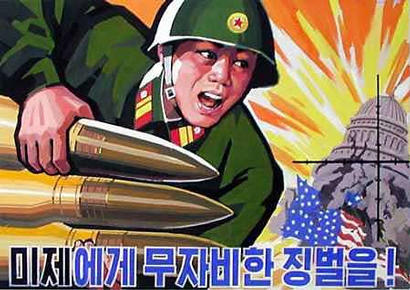
North Korea performed a nuclear test this weekend which, according to various seismic tests, amounted to a blast of somewhere between 4 and 20 kilotons (possibly larger than the US’ bombing of Hiroshima in 1945). The significance of the test cannot be discounted, as Pyongyang’s 2006 blast was a mere 1 kt. With increased missile technology, more bellicose language towards the West, and the breakdown of 6-party talks, nuclear North Korea continues to raise its threat against the West (and even more so against its neighbors Japan and South Korea). The test quickly put North Korea back in the headlines – a place it wants to be. US President Obama responded quickly, vowing quick action against Pyongyang while working with friends and allies to stand up to the threat. Many international thought leaders have called North Korea a real “test for Obama“. The UN also issued a fast statement, condemning North Korea and pointing out that the test violated a 2006 UNSC resolution. US Ambassador to the UN Susan Rice announced that Pyongyang will “pay the price” for its actions against the international community.
Strong statements of disapproval aside, what is to be done? The idea of nuclear weapons in the hands of Kim Jong-Il and his military cronies is generally accepted as an apocalyptic situation. North Korea’s weekend blast certainly measured high on the kiloton scale. It also set off a series of commentary from various international publications and blogs, both liberal and conservative, that point to Beijing as the ultimate controller of the situation. It’s no surprise: the key, according to many, is China.
So, what exactly are some global analysts writing about China’s role in the North Korea crisis?
Let’s start with Judith Miller of Fox. In an article entitled “The Key to Reining In North Korea? It’s China, Stupid…” she explains that because of Beijing’s energy dominance over Pyongyang (China provides “between 80-90 percent of North Korea’s power, 90 percent of its crude oil and all of its diesel fuel. Between 70 and 80 percent of North Korea’s food imports come through China.”), China has what it takes to force North Korea into submission and to get it to return to talks with the US. If that doesn’t work, Miller explains, then the US might have to explore a military option.
Mark Urban for the BBC writes that “China is in the driving seat over North Korea” essentially because no other nation is in a naturally comparative position. He also explains that unlike other international issues that require UNSC cooperation with reluctant Chinese and Russian partnering such as Iran, Zimbabwe or Sudan, the issue of North Korea does not have any large division between Washington and Beijing. It is in the mutual interest of the US and China to curtail North Korea’s nuclear activity… after all, it was China who has been central to the 6-party talks However, China, not the US, is the nation with the real power to do so.
Stuart Whatley of the Huffington Post writes that “China is the variable to watch in this geopolitical equation, not North Korea.” Whatley explains that it is China’s growing and increased international clout from its standing of financial power and comparative fiscal robustness that puts Beijing in a good place to deal with North Korea and drive a diplomatic agenda. In addition, since China is North Korea’s main trading partner, it has the most to lose or gain from any joint international action, such as a decision over sanctions. Since China and the US have respectively played “good cop/bad cop” on North Korea for the past several years, it only makes sense that Pyongyang will be more receptive to actions from China. However, if the US and China can actually coordinate their policies, it will be much more effective and potentially successful in getting North Korea to abandon its nuclear program.
Investigating Beijing’s mindset a little more deeply, Mark MacKinnon of Globe and Mail, illustrates China’s position as a quieter one that wants to tone down sharp and reactionary language toward Pyongyang. Beijing is in a bit of a crisis over what to do about North Korea. While China certainly wants the denuclearization of the Korean Peninsula, it also craves stability there. For Beijing, the best way to go about dealing with North Korea is to diffuse the crisis quietly, and not to provoke Pyongyang even more. After all, it seems that Kim Jong-Il might not last too much longer, and his potential successor will quite possibly try to secure more positive relationships with allies and enemies alike.
It’s not just analysts and bloggers who point to Beijing’s indispensability over the North Korea issue. US politicians are also clearly aware of China’s importance. Speaker of the House Nancy Pelosi announced this while on a trip to Beijing today:
“The Chinese must use their influence to help bring North Korea to the table for the six-party talks. Today’s announcement makes that need all the more urgent.”
So what will China do? So far, Beijing has publicly done little about the weekend’s nuclear test in North Korea. Chinese Foreign Ministry spokesman Ma Zhaoxu announced yesterday that “Beijing has two main objectives – a nuclear-free Korean peninsula, as well as safeguarding peace and stability in Northeast Asia.” As is likely the case, what really happens might be confused and shrouded under various covert diplomatic channels. No matter what China’s role is, I would expect the imprisoned US journalists Laura Ling and Euna Lee to play an increased role as collateral from Pyongyang. I also expect South Korea and the US in particular to give up a few more concessions before North Korea returns to any talks with the Americans. The real question is what Beijing will do, perhaps surreptitiously, that will cause Pyongyang to shift in its actions.
Image: North Korean Propaganda from 2003.